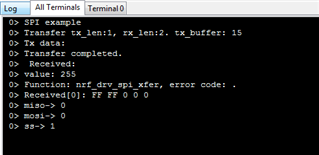Hi,
I tried interfacing LIS3Dh using SPI, I used the SPI example to start with, when I didn't get the desired result, I look numerous question on the forum and tried to modify the code but it does not seem to be working.
I am simply trying to read WHO_AM_I register/or any other register, I am getting FF always,
the sensor is embedded on PCB with following configurations:
Configurations:
| LIS3DH | nrf 51822 pin | sdk_config.h |
| SCK | 9 | SPI_SCK_PIN 9 |
| SDI | 10 | SPI_MOSI_PIN 10 |
| CS | 12 | SPI_SS_PIN 12 |
| SDO | 7 | SPI_MISO_PIN 11 |
Below code is trying to read who_am_i ( 0x0F)
Fullscreen
1
2
3
4
5
6
7
8
9
10
11
12
13
14
15
16
17
18
19
20
21
#define SPI_INSTANCE 0 /**< SPI instance index. */
static const nrf_drv_spi_t spi = NRF_DRV_SPI_INSTANCE(SPI_INSTANCE); /**< SPI instance. */
static volatile bool spi_xfer_done; /**< Flag used to indicate that SPI instance completed the transfer. */
#define TEST_STRING "Nordic"
static uint8_t m_tx_buf[]={0x0F}; /**< TX buffer. */
static uint8_t m_rx_buf[]={0x00, 0x00,0x00, 0x00,0x00}; /**< RX buffer. */
//static const uint8_t m_length = sizeof(m_rx_buf); /**< Transfer length. */
/**
* @brief SPI user event handler.
* @param event
*/
void spi_event_handler(nrf_drv_spi_evt_t const * p_event)
{
spi_xfer_done = true;
SEGGER_RTT_printf(0,"Transfer completed.\r\n");
if (1 != 0)
{
SEGGER_RTT_printf(0," Received: \r\n");
NRF_LOG_HEXDUMP_INFO(m_rx_buf, strlen((const char *)m_rx_buf));
log output ( in every case I am getting FF value in rx_buff )

SDK Used: 12.2
using JLink to transfer the via SWO
I have tried with different modes and frequencies also but no luck.
Please help.

